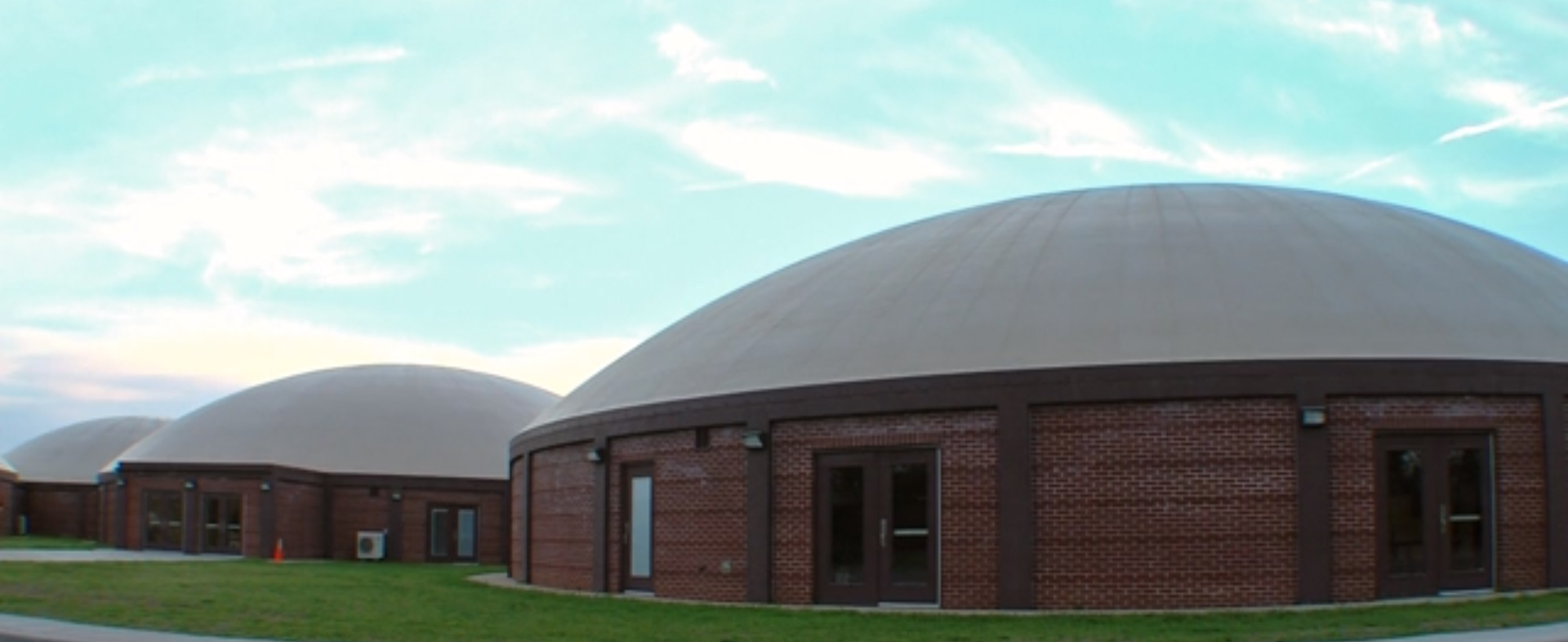In the wake of natural disasters and school shooting incidents, education professionals across the country are looking for innovative ways to better protect children while they learn. A new building approach from Salt Lake City, Utah-based Leland A. Gray Architects is designed to contribute to that goal.
The firm is adapting the concrete thinshell structural approach for K-12 schools in Utah, according to a report by KSL.
The domed building, which the architect calls "virtually indestructible," uses an air-formed thin-shell concrete dome, along with a concrete stem wall. The system was created for assembly buildings such as schools, churches, and arenas, but some school disctricts are finding that it works well for K-12 school buildings, as well.
To build one of these structures, the roofing membrane is formed into a dome shape with a 31-ounce PVC material. A concrete ring on the stem wall is attached to an air form, and the membrane is inflated by air pressure to the size of the dome. Then, the underside of the membrane is sprayed with a urethane insulation to a depth of 3 inches over the entire surface of the membrane.
Steel reinforcing bars are then placed in an interlocking pattern across the dome's underside. Finally, according to Leland Gray's website: "The reinforcing steel is built up to 4 feet high around the base of the dome and sprayed with shot-crete. This process continues in 4-foot-wide bands from the base to the top of the dome. The concrete will be 8 to 10 inches thick at the base, tapering to 3 to 4 inches thick at the top."
Schools like this have already been built in Utah and in other places across the country, in part, because they are relatively inexpensive to build and they can save school districts money in utilities.
According to KSL, which did a story on dome schools in Locust Grove, Utah, "both the elementary and the high school in Locust Grove cost $94 a square foot to build. That's a deal, considering the price for school construction in the U.S. ranges from $150-$250 a square foot." In addition, the superintendent of the district told reporters that these buildings cut utility costs by 40%.
Read the full KSL story here.
Check out the video below to see what goes into a concrete thinshell dome, and what one looks like from the inside.
Related Stories
| Feb 10, 2011
Zero Energy Buildings: When Do They Pay Off in a Hot and Humid Climate?
There’s lots of talk about zero energy as the next big milestone in green building. Realistically, how close are we to this ambitious goal? At this point, the strategies required to get to zero energy are relatively expensive. Only a few buildings, most of them 6,000 sf or less, mostly located in California and similar moderate climates, have hit the mark. What about larger buildings, commercial buildings, more problematic climates? Given the constraints of current technology and the comfort demands of building users, is zero energy a worthwhile investment for buildings in, for example, a warm, humid climate?
| Feb 9, 2011
Hospital Construction in the Age of Obamacare
The recession has hurt even the usually vibrant healthcare segment. Nearly three out of four hospital systems have put the brakes on capital projects. We asked five capital expenditure insiders for their advice on how Building Teams can still succeed in this highly competitive sector.
| Feb 9, 2011
Businesses make bigger, bolder sustainability commitments
In 2010, U.S. corporations continued to enhance their sustainable business efforts by making bigger, bolder, longer-term sustainability commitments. GreenBiz issued its 4th annual State of Green Business report, a free downloadable report that measures the progress of U.S. business and the economy from an environmental perspective, and highlights key trends in corporate culture in regard to the environment.
| Feb 8, 2011
AIA names 104 members to College of Fellows
The Fellowship program was developed to elevate those architects who have made a significant contribution to architecture and society and who have achieved a standard of excellence in the profession. Election to fellowship not only recognizes the achievements of architects as individuals, but also their significant contribution to architecture and society on a national level.
| Feb 4, 2011
President Obama: 20% improvement in energy efficiency will save $40 billion
President Obama’s Better Buildings Initiative, announced February 3, 2011, aims to achieve a 20% improvement in energy efficiency in commercial buildings by 2020, improvements that will save American businesses $40 billion a year.
| Jan 31, 2011
Cuningham Group Architecture launches Healthcare studio with Lee Brennan
International design firm Cuningham Group Architecture, P.A. (Cuningham Group) has announced the arrival of Lee Brennan, AIA, as Principal and Leader of its new Healthcare studio. Brennan comes to Cuningham Group with over 30 years of professional experience, 22 of those years in healthcare, encompassing all aspects of project delivery, from strategic planning and programming through design and construction. The firm’s new Healthcare studio will enhance Cuningham Group’s expertise in leisure and entertainment, education, mixed-use/housing and workplace environments.
| Jan 31, 2011
HDR Architecture Releases Evidence-based Design Videos
As a follow-up to its book Evidence-based Design for Healthcare Facilities, HDR Architecture, Inc. has released three video case studies that highlight evidence-based design principles in action.
| Jan 31, 2011
CISCA releases White Paper on Acoustics in Healthcare Environments
The Ceilings & Interior Systems Construction Association (CISCA) has released an extensive white paper “Acoustics in Healthcare Environments” for architects, interior designers, and other design professionals who work to improve healthcare settings for all users. This white paper serves as a comprehensive introduction to the acoustical issues commonly confronted on healthcare projects and howbest to address those.
| Jan 28, 2011
Firestone Building Products Unveils FirestoneRoof Mobile Web App
Firestone Building Products Company unveiled FirestoneRoof, a first-of-its-kind free mobile web app. The FirestoneRoof mobile web app enables customers to instantly connect with Firestone commercial roofing experts and is designed to make it easier for building owners, facility managers, roofing consultants and others charged with maintaining commercial roofing systems to get the support they need, when they need it.
| Jan 27, 2011
Perkins Eastman's report on senior housing signals a changing market
Top international design and architecture firm Perkins Eastman is pleased to announce that the Perkins Eastman Research Collaborative recently completed the “Design for Aging Review 10 Insights and Innovations: The State of Senior Housing” study for the American Institute of Architects (AIA). The results of the comprehensive study reflect the changing demands and emerging concepts that are re-shaping today’s senior living industry.












